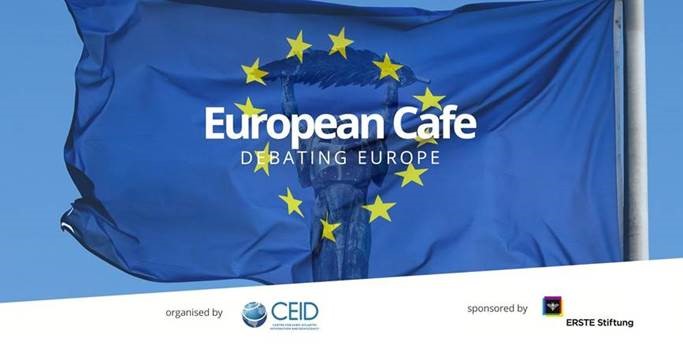
29 Nov European Café: On the campaign trail
Event summary
In 2023 CEID is renewed its European Cafe series of discussions, which focuses on a selected expert discussions on the main dilemmas of Hungarian foreign policy. The discussions are not be open to the press. The aim of the programme is to bring together views in a civilised way and to formulate a minimum foreign policy in the form of concrete proposals.
At our European Café on May 29, we discussed the campaign ahead of the June 9 European elections in selected Central European countries. The roundtable, moderated by CEID Senior Fellow Edit Inotai, brought together three journalists to discuss the stakes and possible outcomes of the June 9 European elections: Ms. Andrea Dernbach, Rome correspondent for Germany’s Der Tagesspiegel, Ms. Meret Bauman, Vienna correspondent for Switzerland’s Neue Zürcher Zeitung, and Ms. Viktória Serdült, journalist and editor of the Hungarian weekly HVG.
Prelude to the European elections: the campaign in the four countries (Hungary, Austria, Germany, Italy) had been different, as they had focused largely on domestic issues. In Germany, for example, the campaign focused largely on the issues of a higher minimum wage, aid for Ukraine and the performance of Chancellor Scholz. Ukraine was also a major issue in Hungary, with Prime Minister Viktor Orban declaring “war or peace” as the main issue of the election. In Austria, the campaign was dominated by personal scandals and immigration, but was seen more as a prelude to national elections in September. In Italy, Prime Minister Giorgia Meloni framed the elections as a referendum on herself and her party, and a vote that would strengthen her European influence and her position as leader of the European Conservatives and Reformists (ECR) party family
Possible outcomes: in line with the polls, the rise of right-wing parties across Europe was predicted by all panellists. In Germany, the rise of the AfD, despite its neo-Nazi scandals, and the unpopularity of the “traffic light coalition” made the CDU (Christian Democrats) a likely winner. There was also a rightward shift in Austria, where the FPÖ and the ÖVP were both predicted to win 20%. In Hungary, Viktor Orban’s Fidesz was still seen on course for victory, but newcomer Péter Magyar’s TISZA party was also estimated to have 5-6 seats – which would mean that the vast majority of Hungary’s 21 MEPs would come from more or less right-wing parties.
There has also been speculation about the formation of political groups in the European Parliament after the elections. Hungary’s Fidesz was said to be waiting for the election results to see which political group it would join, in order to break out of the non-aligned group. There was a general consensus among the panellists that Prime Minister Orban’s party needs a political group. Italian Prime Minister Meloni’s ECR seems to be the most favourable choice for Orban, as he himself had previously indicated. However, Orban’s pro-Russian stance on the Russia-Ukraine issue could be an obstacle, as both ECR’s Giorgia Meloni and his former Polish ally Jarosław Kaczyński have clearly different positions on this issue.
Overall, the key takeaway from the discussion was that European elections are unlikely to topple governments, but they are important indicators of the political climate in all four countries, especially those with upcoming national elections. Domestic scandals can always have a last-minute impact on voter preferences before elections, but the issues surrounding Ukraine are likely to remain on the agenda of domestic and European Union debates for a long time. That said, perhaps the biggest stakes in the June 9th elections are how strong the far-right advances and how effectively the mainstream/centre parties can resist this surge.

